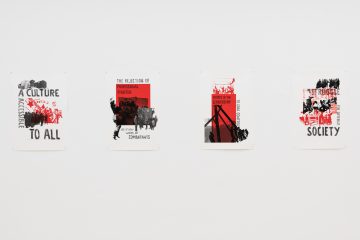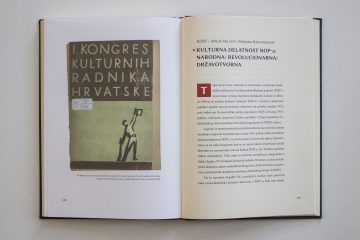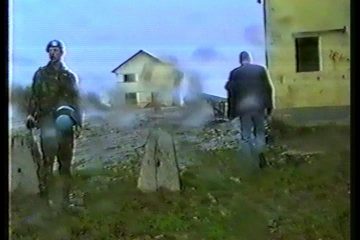————–
How to Revolutionize Art. Collective Practice and Political Organization of Artists in the Interwar Period in Yugoslavia
————–
Im Rahmen ihrer künstlerischen Investigation zur Kultur der Partisan_innenbewegung in Jugoslawien mit dem Titel Lessons in Defense wird das Künstler_innenkollektiv KURS eine Kunsthistorikerin und eine Kuratorin zu Gast haben, die sich in ihrer Forschung mit progressiven Künstler_innengruppierungen der 1930er Jahre aus Zagreb und Belgrad beschäftigen, die wiederum einen Einfluß auf die Kultur der Partisan_innen während des Zweiten Weltkriegs ausgeübt haben.
Vesna Vuković wird die Forschungsarbeit des Kollektivs BLOK (Politische Schule für Künstler_innen) „The Art of the Collective – Case Zemlja“ (2016 – 2019) präsentieren, die sich mit der Künstlervereinigung Zemlja auseinandersetzt. Zemlja war eine sozial engagierte Gruppe von Maler_innen, Bildhauer_innen, Architekt_innen, Arbeiter_innen und Landwirt_innen, die zwischen 1929 und 1935 bestand und eines der ersten Beispiele für selbstorganisierte programmatische Künstler_innenzusammenschlüsse in Jugoslawien. Im Fokus dieser kollektiven künstlerischen Unternehmung stand eine präzise Analyse des breiteren sozio-politischen Kontext der Zwischenkriegszeit. Die Historisierung des „Falles Zemlja“ wirft eine Frage auf, die von den bestehenden Narrativen vernachlässigt wird: jene nach den Beziehungen zwischen den Mitgliedern der Vereinigung und den sozialen Bewegungen der Zeit. Dementsprechend widmete BLOK ihre Forschungsarbeit der Frage, wie die Künstler_innen die soziale Funktion ihrer Praxis begriffen und wie sich die heteronome Kritik der Autonomie der Kunst in der Vereinigung selbst und darüber hinaus auf dem gesamten künstlerischen Feld widerspiegelte. Obwohl fast ein Jahrhundert die kollektive Arbeit Zemljas und deren Fragestellungen von der Gegenwart trennt, glaubt das BLOK-Kollektiv an die aktuelle Relevanz der Fragen nach der Konstitution linksorientierter Kunstpraxis, der Besonderheiten kollektiver Kunstproduktion sowie der Auswirkungen dieser Praxis auf die Mitglieder des Kollektivs selbst.
Diese Präsentation von Vesna Vuković hören Sie in der April Ausgabe vom Büchs’n’Radio.
————–
How to Revolutionize Art. Collective Practice and Political Organization of Artists in the Interwar Period in Yugoslavia
————–
In the context of their artistic investigation into the partisan culture in Yugoslavia titled Lessons in Defense, the KURS collective will host two guests who are researching about progressive artistic groups from Zagreb and Belgrade form 1930’s that influenced the partisan culture during World War II. After an introduction by KURS (Miloš Miletić and Mirjana Radovanović), Vida KNEŽEVIĆ (art historian) and Vesna VUKOVIĆ (curator) will talk about the illegal group Život (Life) respectively and the Zemlja Artists‘ Association.
Vesna Vuković will present the collective research “The Art of the Collective – The Case Zemlja” (2016 – 2019) which was done by BLOK (Political School for Artists) and dealt with the Zemlja Artists’ Association (1929 – 1935), a socially engaged group of painters, sculptors, architects, workers, and peasants artists, one of the first examples of self-organized programmatic gathering of artists in Yugoslavia. Through a collective artistic endeavor, the group dissected the broader sociopolitical context of the interwar period. The historicization of “Case Zemlja” has raised an issue neglected by the existing narratives: the relationships between the members of the association and the social movements of that time. BLOK’s research took a closer look into how the artists understood the social function of their practice, and how the heteronomous critique of the autonomy of art resonated within the Association itself and the artistic field at large. Although almost an entire century separates BLOK from the Zemlja’s collective work, the group believes that the search for the answer to the questions of what is leftist art, how art is collectively created and how this art affects the collective’s members, are still relevant today.
In this broadcast you will hear the presentation of KURS (Miloš Miletić and Mirjana Radovanović) and Vesna VUKOVIĆ.













